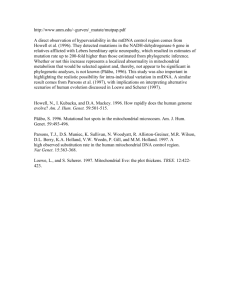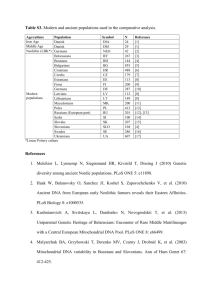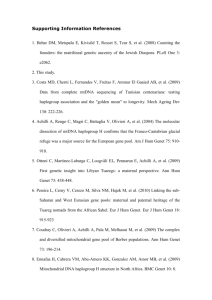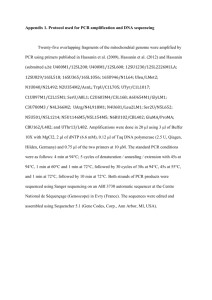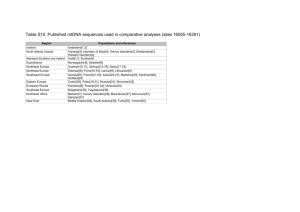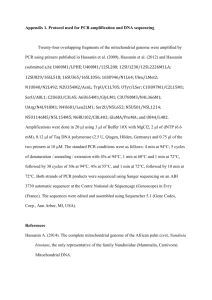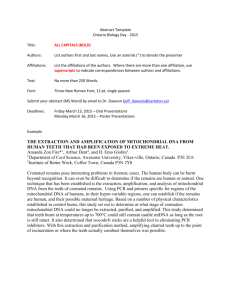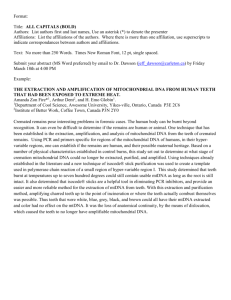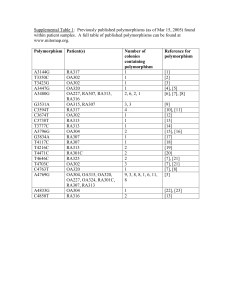Supplementary Material (doc 214K)
advertisement
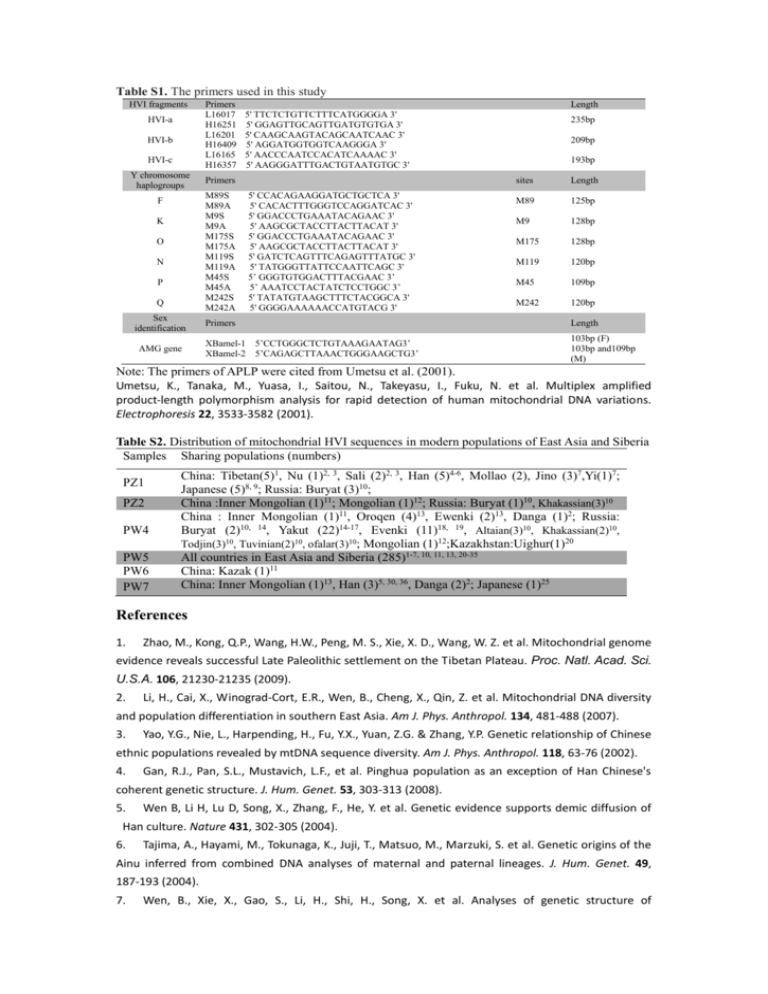
Table S1. The primers used in this study HVI fragments HVI-a HVI-b HVI-c Y chromosome haplogroups Primers L16017 H16251 L16201 H16409 L16165 H16357 Primers M89S M89A M9S M9A M175S M175A M119S M119A M45S M45A M242S M242A F K O N P Q Sex identification AMG gene Length 5' TTCTCTGTTCTTTCATGGGGA 3' 5' GGAGTTGCAGTTGATGTGTGA 3' 5' CAAGCAAGTACAGCAATCAAC 3' 5' AGGATGGTGGTCAAGGGA 3' 5' AACCCAATCCACATCAAAAC 3' 5' AAGGGATTTGACTGTAATGTGC 3' 5' CCACAGAAGGATGCTGCTCA 3' 5' CACACTTTGGGTCCAGGATCAC 3' 5' GGACCCTGAAATACAGAAC 3' 5' AAGCGCTACCTTACTTACAT 3' 5' GGACCCTGAAATACAGAAC 3' 5' AAGCGCTACCTTACTTACAT 3' 5' GATCTCAGTTTCAGAGTTTATGC 3' 5' TATGGGTTATTCCAATTCAGC 3' 5’ GGGTGTGGACTTTACGAAC 3’ 5’ AAATCCTACTATCTCCTGGC 3’ 5' TATATGTAAGCTTTCTACGGCA 3' 5' GGGGAAAAAACCATGTACG 3' 235bp 209bp 193bp sites Length M89 125bp M9 128bp M175 128bp M119 120bp M45 109bp M242 120bp Primers Length XBamel-1 5’CCTGGGCTCTGTAAAGAATAG3’ XBamel-2 5’CAGAGCTTAAACTGGGAAGCTG3’ 103bp (F) 103bp and109bp (M) Note: The primers of APLP were cited from Umetsu et al. (2001). Umetsu, K., Tanaka, M., Yuasa, I., Saitou, N., Takeyasu, I., Fuku, N. et al. Multiplex amplified product-length polymorphism analysis for rapid detection of human mitochondrial DNA variations. Electrophoresis 22, 3533-3582 (2001). Table S2. Distribution of mitochondrial HVI sequences in modern populations of East Asia and Siberia Samples Sharing populations (numbers) PZ1 PZ2 PW4 PW5 PW6 PW7 China: Tibetan(5)1, Nu (1)2, 3, Sali (2)2, 3, Han (5)4-6, Mollao (2), Jino (3)7,Yi(1)7; Japanese (5)8, 9; Russia: Buryat (3)10; China :Inner Mongolian (1)11; Mongolian (1)12; Russia: Buryat (1)10, Khakassian(3)10 China : Inner Mongolian (1)11, Oroqen (4)13, Ewenki (2)13, Danga (1)2; Russia: Buryat (2)10, 14, Yakut (22)14-17, Evenki (11)18, 19, Altaian(3)10, Khakassian(2)10, Todjin(3)10, Tuvinian(2)10, ofalar(3)10; Mongolian (1)12;Kazakhstan:Uighur(1)20 All countries in East Asia and Siberia (285)1-7, 10, 11, 13, 20-35 China: Kazak (1)11 China: Inner Mongolian (1)13, Han (3)5, 30, 36, Danga (2)2; Japanese (1)25 References 1. Zhao, M., Kong, Q.P., Wang, H.W., Peng, M. S., Xie, X. D., Wang, W. Z. et al. Mitochondrial genome evidence reveals successful Late Paleolithic settlement on the Tibetan Plateau. Proc. Natl. Acad. Sci. U.S.A. 106, 21230-21235 (2009). 2. Li, H., Cai, X., Winograd-Cort, E.R., Wen, B., Cheng, X., Qin, Z. et al. Mitochondrial DNA diversity and population differentiation in southern East Asia. Am J. Phys. Anthropol. 134, 481-488 (2007). 3. Yao, Y.G., Nie, L., Harpending, H., Fu, Y.X., Yuan, Z.G. & Zhang, Y.P. Genetic relationship of Chinese ethnic populations revealed by mtDNA sequence diversity. Am J. Phys. Anthropol. 118, 63-76 (2002). 4. Gan, R.J., Pan, S.L., Mustavich, L.F., et al. Pinghua population as an exception of Han Chinese's coherent genetic structure. J. Hum. Genet. 53, 303-313 (2008). 5. Wen B, Li H, Lu D, Song, X., Zhang, F., He, Y. et al. Genetic evidence supports demic diffusion of Han culture. Nature 431, 302-305 (2004). 6. Tajima, A., Hayami, M., Tokunaga, K., Juji, T., Matsuo, M., Marzuki, S. et al. Genetic origins of the Ainu inferred from combined DNA analyses of maternal and paternal lineages. J. Hum. Genet. 49, 187-193 (2004). 7. Wen, B., Xie, X., Gao, S., Li, H., Shi, H., Song, X. et al. Analyses of genetic structure of Tibeto-Burman populations reveals sex-biased admixture in southern Tibeto-Burmans. Am J. Hum. Genet. 74, 856-865 (2004). 8. Guo, L.J., Oshida, Y., Fuku, N., Takeyasu, T., Fujita, Y., Kurata, M. et al. Mitochondrial genome polymorphisms associated with type-2 diabetes or obesity. Mitochondrion 5, 15-33 (2005). 9. Horai S, Murayama K, Hayasaka K, Matsubayashi, S., Hattori, Y., Fucharoen, G. et al. mtDNA polymorphism in East Asian Populations, with special reference to the peopling of Japan. Am J. Hum. Genet. 59, 579-590 (1996). 10. Derenko, M.V., Grzybowski, T., Malyarchuk, B.A., Dambueva, I. K., Denisova, G. A., Czarny, J. et al. Diversity of mitochondrial DNA lineages in South Siberia. Ann. Hum. Genet. 67, 391-411 (2003). 11. Yao, Y.G., Kong, Q.P., Wang, C.Y., Zhu, C.L. & Zhang, Y.P. Different matrilineal contributions to genetic structure of ethnic groups in the silk road region in china. Mol. Biol. Evol. 21, 2265-2280 (2004). 12. Kolman, C.J., Sambuughin, N. & Bermingham, E. Mitochondrial DNA analysis of Mongolian populations and implications for the origin of New World founders. Genetics 142, 1321-1334 (1996). 13. Kong, Q.P., Yao, Y.G., Liu, M., Shen, S.P., Chen, C., Zhu, C.L., et al. Mitochondrial DNA sequence polymorphisms of five ethnic populations from northern China. Hum. Genet. 113, 391-405 (2003). 14. Pakendorf, B., Wiebe, V., Tarskaia, L.A., Spitsyn, V. A., Soodyall, H., Rodewald, A. et al. Mitochondrial DNA evidence for admixed origins of central Siberian populations. Am J. Phys. Anthropol. 120, 211-24 (2003). 15. Volodko, N.V., Starikovskaya, E.B., Mazunin, I.O., Eltsov, N. P., Naidenko, P. V., Wallace, D. C. et al. Mitochondrial genome diversity in arctic Siberians, with particular reference to the evolutionary history of Beringia and Pleistocenic peopling of the Americas. Am J. Hum. Genet. 82, 1084-1100 (2008). 16. Ingman, M., & Gyllensten, U. Rate variation between mitochondrial domains and adaptive evolution in humans. Hum. Mol. Genet. 16, 2281-2287 (2007). 17. Fedorova, S.A., Bermisheva, M.A., Villem, R., Maksimova, N.R. & Khusnutdinova, E.K. Analysis of Mitochondrial DNA Lineages in Yakuts. Molecular Biology 37, 544–553 (2003). 18. Ingman, M., Kaessmann, H., Paabo, S. & Gyllensten, U. Mitochondrial genome variation and the origin of modern humans. Nature 408, 708-713 (2000). 19. Starikovskaya, E.B., Sukernik, R.I., Derbeneva, O.A., Volodko, N. V., Ruiz-Pesini, E., Torroni, A. et al. Mitochondrial DNA diversity in indigenous populations of the southern extent of Siberia, and the origins of Native American haplogroups. Ann. Hum. Genet. 69, 67-89 (2005). 20. Comas, D., Calafell, F., Mateu, E., Perez-Lezaun, A., Bosch, E., Martinez-Arias, R. et al. Trading genes along the silk road: mtDNA sequences and the origin of central Asian populations. Am J. Hum. Genet. 63, 1824-1838 (1998). 21. Irwin, J.A., Saunier, J.L., Niederstatter, H., Strouss, K. M., Sturk, K. A., Diegoli, T. M. et al. Investigation of heteroplasmy in the human mitochondrial DNA control region: a synthesis of observations from more than 5000 global population samples. J. Mol. Evol. 68, 516-527 (2009) 22. Nohira, C., Maruyama, S. & Minaguchi, K. Phylogenetic classification of Japanese mtDNA assisted by complete mitochondrial DNA sequences. Int. J. Legal. Med. (2008). 23. Ji, Y., Zhang, A.M., Jia, X., Zhang, Y. P., Xiao, X., Li, S. et al. Mitochondrial DNA haplogroups M7b1'2 and M8a affect clinical expression of leber hereditary optic neuropathy in Chinese families with the m.11778G-->a mutation. Am J. Hum. Genet. 83,760-768 (2008). 24. Kazuno, A.A., Munakata, K., Mori, K., Tanaka, M., Nanko, S., Kunugi, H. et al. Mitochondrial DNA sequence analysis of patients with 'atypical psychosis'. Psychiatry Clin. Neurosci. 59, 497-503 (2005). 25. Bilal, E., Rabadan, R., Alexe, G., Fuku, N., Ueno, H., Nishigaki, Y. et al. Mitochondrial DNA haplogroup D4a is a marker for extreme longevity in Japan. PloS one 3, e2421 (2008). 26. Hill, C., Soares, P., Mormina, M., Macaulay, V., Clarke, D., Blumbach, P. B. et al. A mitochondrial stratigraphy for island southeast Asia. Am J. Hum. Genet. 80, 29-43 (2007) 27. Kong, Q.P., Yao, Y.G., Sun, C., Bandelt, H.J., Zhu, C.L. & Zhang, Y.P. Phylogeny of east Asian mitochondrial DNA lineages inferred from complete sequences. Am J. Hum. Genet. 73, 671-676 (2003). 28. Tanaka, M., Cabrera, V.M., Gonzalez, A.M., Larruga, J. M., Takeyasu, T., Fuku, N. et al. Mitochondrial genome variation in eastern Asia and the peopling of Japan. Genome Res. 14, 1832-1850 (2004). 29. Yao, Y.G. & Zhang, Y.P. Phylogeographic analysis of mtDNA variation in four ethnic populations from Yunnan Province: new data and a reappraisal. J. Hum. Genet. 47, 311-318 (2002). 30. Yao, Y.G., Kong, Q.P., Bandelt, H.J., Kivisild, T. & Zhang, Y.P. Phylogeographic differentiation of mitochondrial DNA in Han Chinese. Am J. Hum. Genet. 70, 635-651 (2002). 31. Tajima, A., Sun, C.S., Pan, I.H., Ishida, T., Saitou, N. & Horai, S. Mitochondrial DNA polymorphisms in nine aboriginal groups of Taiwan: implications for the population history of aboriginal Taiwanese. Hum. Genet. 113, 24-33 (2003). 32. Yao, Y.G., Kong, Q.P., Man, X.Y., Bandelt, H.J. & Zhang, Y.P. Reconstructing the evolutionary history of China: a caveat about inferences drawn from ancient DNA. Mol. Biol. Evol. 20, 214-219 (2003). 33. Yao, Y.G., Lu, X.M., Luo, H.R., Li, W.H. & Zhang, Y.P. Gene admixture in the silk road region of China: evidence from mtDNA and melanocortin 1 receptor polymorphism. Genes & genetic systems 75, 173-178 (2000). 34. Wen, B., Li, H., Gao, S., Mao, X., Gao, Y., Li, F. et al. Genetic structure of Hmong-Mien speaking populations in East Asia as revealed by mtDNA lineages. Mol. Biol. Evol. 22, 725-734 (2005). 35. Kivisild, T., Tolk, H.V., Parik, J., Wang, Y., Papiha, S. S., Bandelt, H. J. et al. The emerging limbs and twigs of the East Asian mtDNA tree. Mol. Biol. Evol. 19, 1737-1751 (2002). 36. Oota, H., Kitano, T., Jin, F., Yuasa, I., Wang, L., Ueda, S. et al. Extreme mtDNA homogeneity in continental Asian populations. Am J. Phys. Anthropol. 118,146-153 (2002). Table S3. The mitochondrial HVI sequences and Y chromosome haplogroups of researchers Researchers Mutations in mitochondrial HVI (16000+) Y chromosome haplogroup R1 R2 R3 R4 R5 183C-189-304 124-183C-189-278-293-362 174-192-223 126-174-223-311-362 182C-183C-189-223-357-362 O3 O3 -
